🐶 Shih Tzu Hypoallergenic Guide ✅: Character, Grooming & Suitability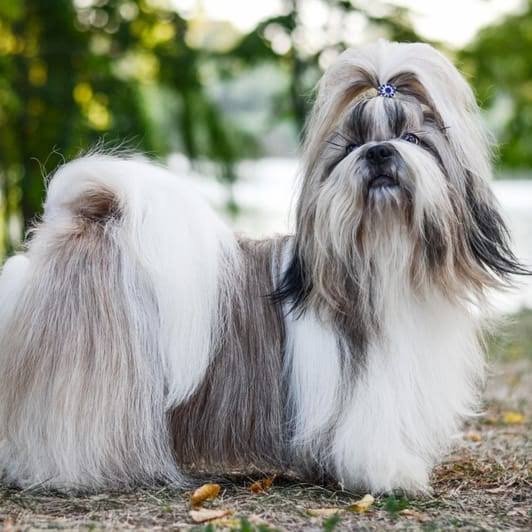
🟢 Hypoallergenic Level: Highly Hypoallergenic
Why Shih Tzus Are Highly HypoallergenicShih Tzus are considered highly hypoallergenic due to several key characteristics:
🏷️ Key Characteristics↑ Back to MenuEssential Breed InformationSize: Small
Height: 9-10.5 inches (23-27 cm) Weight: 9-16 lbs (4-7 kg)
Lifespan: 10-18 years
Activity Level: Low to Moderate
Grooming: High Maintenance
Hypoallergenic: Highly Hypoallergenic
Coat ColorsThe Shih Tzu comes in a stunning variety of colors including: Black, White, Gold, Liver, Red, Blue, Silver, Brindle, and various combinations of these colors. Many Shih Tzus display beautiful multi-colored patterns. 
Shih Tzu puppy with characteristic flowing coat
🏛️ Origin & History↑ Back to MenuThe Shih Tzu is an ancient breed with a history steeped in Chinese imperial tradition. The name "Shih Tzu" translates to "Lion Dog" in Mandarin, reflecting their resemblance to the lions depicted in traditional Chinese art. These dogs were bred exclusively for Chinese royalty, particularly during the Ming and Qing dynasties, where they lived a life of luxury in the Forbidden City. Historical records suggest that the Shih Tzu originated from crossing Tibetan breeds, likely the Lhasa Apso, with Chinese breeds such as the Pekingese. Tibetan monks would present these dogs as gifts to Chinese emperors, where they were further refined into the companion breed we know today. The Shih Tzu was so treasured that Chinese royalty refused to sell, trade, or give them away for many years, making them one of the most exclusive dogs in history. 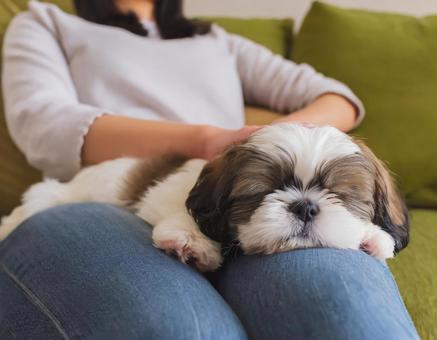
Shih Tzu enjoying their traditional role as a companion
The breed nearly faced extinction during the Chinese Communist Revolution in the 1940s when the entire palace dog population was at risk. Fortunately, a small number of Shih Tzus had been gifted to European nobility and dog enthusiasts in the early 20th century. These dogs became the foundation for rebuilding the breed in England and later in the United States. The American Kennel Club officially recognized the Shih Tzu in 1969, and since then, they have become one of the most popular companion breeds worldwide. 💕 Character & Temperament↑ Back to MenuThe Shih Tzu is renowned for its affectionate and outgoing personality. These dogs were bred specifically to be companion animals, and this purpose is evident in every aspect of their temperament. They thrive on human interaction and form deep bonds with their family members. Unlike some breeds that may be aloof or independent, the Shih Tzu actively seeks attention and loves nothing more than being close to their owners. 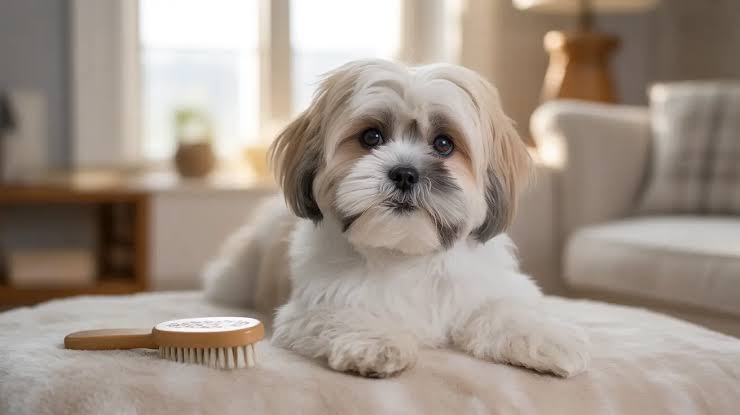
Shih Tzu content in their favorite indoor spot
These dogs possess a friendly and trusting nature that makes them excellent family pets. They generally get along well with children, other dogs, and even cats when properly socialized. The Shih Tzu typically greets strangers with curiosity rather than suspicion, making them poor guard dogs but wonderful social companions. Their playful yet gentle demeanor makes them suitable for families with young children, though supervision is always recommended with small dogs.
One notable characteristic of the Shih Tzu is their confident and sometimes stubborn streak. Despite their small size, they carry themselves with dignity and can be quite determined when they set their mind to something. This trait, inherited from their imperial past, means that training requires patience and positive reinforcement methods. They respond well to treats, praise, and gentle guidance but may resist harsh corrections or repetitive drilling. 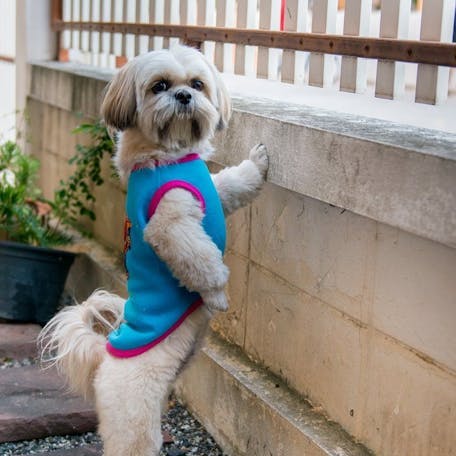
Curious Shih Tzu observing their surroundings
👀 Physical Appearance↑ Back to MenuThe Shih Tzu is instantly recognizable by its luxurious double coat that flows to the ground when fully grown. Their coat is one of their most distinctive features, consisting of a soft, dense undercoat and a longer, silky topcoat. The hair on their face grows upward and outward, creating the characteristic "chrysanthemum face" that gives them their unique expression. Many owners tie the facial hair in a topknot to keep it out of the dog's eyes. 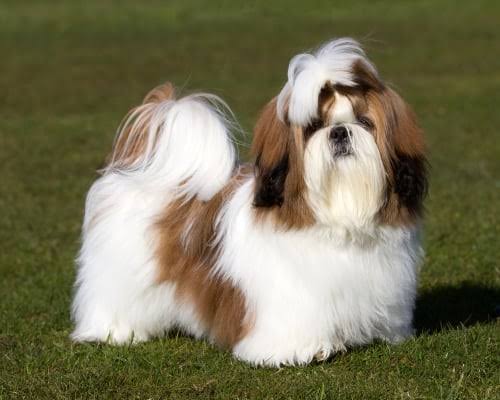
Shih Tzu showcasing their elegant coat outdoors
Physically, the Shih Tzu has a compact and sturdy build despite their small size. They have a slightly rectangular body that is longer than it is tall, with a level topline and a tail that curves gracefully over the back, covered in long, flowing hair. Their head is round and broad with wide-set eyes that give them a warm, friendly expression. The eyes are large, dark, and round, though liver and blue-coated dogs may have lighter-colored eyes.
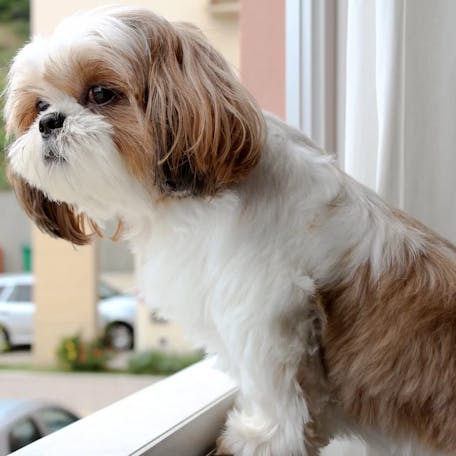
Curious Shih Tzu watching the world outside
The breed's short muzzle and undershot bite give them their distinctive pushed-in face. Their nose is usually black, though it may be liver-colored on liver or liver-marked dogs. The ears are large and pendant-shaped, covered in abundant hair that blends seamlessly with their neck and body coat. When properly groomed, the Shih Tzu presents an elegant and regal appearance that harks back to their imperial heritage. 🏃 Activity Needs↑ Back to MenuThe Shih Tzu has relatively modest exercise requirements compared to many other breeds. These dogs were bred as indoor companions rather than working dogs, and their exercise needs reflect this heritage. A couple of short walks per day, totaling about 20-30 minutes, combined with indoor play sessions, is typically sufficient to keep a Shih Tzu healthy and happy. 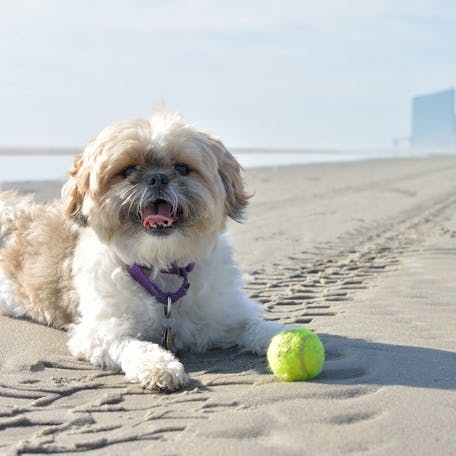
Shih Tzu enjoying beach playtime
While they don't require extensive exercise, Shih Tzus do enjoy interactive play and mental stimulation. They love playing with toys, especially those that involve their owners. Games like gentle fetch, hide-and-seek with treats, or puzzle toys can provide both physical activity and mental enrichment. These dogs are also quite content with simply following their owners around the house and being involved in daily activities.
It's important to note that Shih Tzus are sensitive to heat due to their short muzzles and heavy coats. Exercise should be limited during hot weather, and walks should be scheduled during cooler parts of the day. They are also not strong swimmers due to their body structure and heavy coat, so water activities should be carefully supervised. Indoor activities are often preferred, making them ideal for apartment living or for owners with limited outdoor space. ✂️ Grooming Care↑ Back to MenuGrooming is one of the most time-intensive aspects of Shih Tzu ownership. Their luxurious coat requires daily attention to prevent matting and tangling. Without regular brushing, their long hair can quickly become knotted, which can be painful for the dog and difficult to remedy. Daily brushing with a pin brush and metal comb is essential for maintaining their coat in show condition. 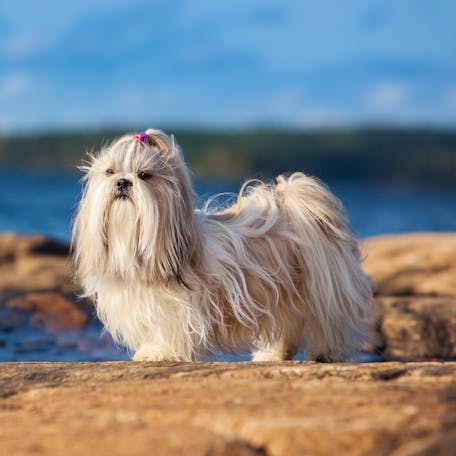
Shih Tzu displaying their magnificent full-length coat
Many pet owners opt for a "puppy cut" or shorter trim to make grooming more manageable. This involves trimming the coat to 1-2 inches in length every 6-8 weeks, which significantly reduces daily maintenance while still maintaining the breed's characteristic appearance. Even with a shorter cut, regular brushing 2-3 times per week is still necessary to prevent matting and keep the coat healthy.
Special attention must be paid to facial hygiene in Shih Tzus. Their facial hair can collect food particles, water, and debris, and their large eyes are prone to tear staining. Daily wiping of the face with a damp cloth, especially around the eyes and mouth, helps prevent staining and skin irritation. The hair in and around the ears should also be checked regularly and kept clean to prevent ear infections. Hypoallergenic Grooming BenefitsThe Shih Tzu's highly hypoallergenic nature is enhanced through regular grooming. Frequent bathing and brushing remove loose hair and dander before they can spread throughout the home, making them an excellent choice for allergy sufferers. Their continuous hair growth (rather than shedding cycles) means allergens stay contained in the coat until removed through grooming. Other grooming needs include regular nail trimming, teeth brushing, and ear cleaning. Nails should be trimmed every 2-3 weeks to prevent them from becoming too long and causing discomfort. Dental care is especially important in small breeds like the Shih Tzu, and daily teeth brushing is recommended to prevent dental disease. Ears should be checked weekly and cleaned as needed to prevent infections, especially since their drop ears can trap moisture. 🍽️ Nutrition Needs↑ Back to MenuShih Tzus require a high-quality, balanced diet appropriate for their size, age, and activity level. As small dogs, they have faster metabolisms than larger breeds and may need to eat more frequently. Most adult Shih Tzus do well on two meals per day, while puppies may require three to four smaller meals to maintain stable blood sugar levels. The typical adult Shih Tzu needs approximately ½ to 1 cup of high-quality dry dog food per day, divided into two meals. However, individual needs can vary based on age, activity level, metabolism, and health status. It's crucial not to overfeed, as Shih Tzus can easily become overweight, which puts additional strain on their short legs and can lead to various health problems.
Look for dog foods that list high-quality protein sources as the first ingredient, such as chicken, beef, fish, or lamb. Small breed formulas are often ideal because they contain smaller kibble sizes that are easier for Shih Tzus to chew. Foods with omega-3 and omega-6 fatty acids can help maintain their luxurious coat. Avoid foods with excessive fillers, artificial preservatives, or by-products. Feeding Tips for Shih TzusAlways provide fresh water, use elevated feeding bowls to prevent facial hair from getting into food, monitor treats carefully (they should not exceed 10% of daily calories), and watch for signs of food allergies such as itching or digestive upset. 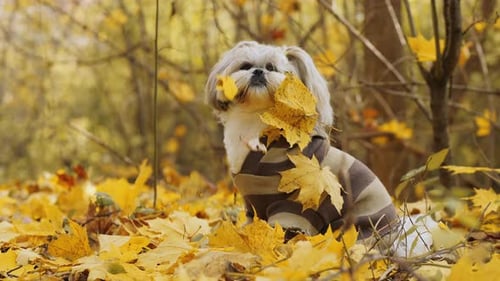
Healthy Shih Tzu enjoying the autumn season
🔍 Discover Your Ideal Hypoallergenic MatchConsidering a Shih Tzu but want to explore all your hypoallergenic options? Our intelligent breed selector analyzes your lifestyle, living space, and allergy concerns to recommend the perfect companions for your family. Find your perfect hypoallergenic companion in just 2 minutes! 👨👩👧👦 Suitable For↑ Back to MenuFamilies with ChildrenShih Tzus can make excellent family pets when paired with respectful children. Their friendly and gentle nature makes them tolerant companions, but their small size means they can be easily injured by rough play. They are best suited for families with older children who understand how to handle small dogs gently. Young children should always be supervised during interactions, and children should be taught not to pull on the dog's long hair or approach them while eating or sleeping. Apartment LivingThe Shih Tzu is ideally suited for apartment living. Their small size, moderate exercise needs, and relatively quiet nature make them perfect urban companions. They don't require a yard and can get adequate exercise through indoor play and short walks. Their adaptability means they're equally comfortable in a small apartment or a large house. However, they should not be left alone for extended periods, as they thrive on companionship and can develop separation anxiety.
First-Time Dog OwnersShih Tzus can be suitable for first-time owners who are prepared for the grooming commitment. Their friendly temperament, manageable size, and moderate exercise needs make them relatively easy to care for in terms of daily management. However, potential owners must be realistic about the significant time investment required for grooming. First-time owners should also be prepared to use consistent, positive training methods, as Shih Tzus can be stubborn and house training may take patience. Seniors and Less Active IndividualsThese dogs are wonderful companions for seniors and less active individuals. Their calm demeanor, low exercise requirements, and affectionate nature make them ideal for people who want a devoted companion without the demands of a high-energy breed. They're content to spend hours sitting on a lap or next to their owner. However, the grooming requirements should be considered, and seniors may want to budget for professional grooming services. Allergy SufferersShih Tzus are highly hypoallergenic dogs and excellent for many allergy sufferers. Their hair grows continuously like human hair rather than shedding seasonally, which keeps allergens contained in the coat. They lack the dense undercoat that traps and releases dander in other breeds. With regular grooming (bathing every 3-4 weeks and daily brushing), dander production remains minimal. Many people with pet allergies find Shih Tzus well-tolerated. However, individuals with severe allergies should still spend time with the breed before committing, as no dog is 100% allergen-free. ⚖️ Pros & Cons↑ Back to Menu✅ Advantages
❌ Challenges
❓ Frequently Asked Questions↑ Back to MenuAre Shih Tzus truly hypoallergenic dogs?Yes, Shih Tzus are highly hypoallergenic dogs and an excellent choice for allergy sufferers. Their hair grows continuously like human hair rather than shedding seasonally, which keeps allergens contained. Key hypoallergenic features include: minimal shedding (hair doesn't fall out and spread dander), no dense undercoat in adults (reducing allergen production), low dander levels with regular grooming, and a silky coat structure that doesn't become airborne. While no dog is 100% allergen-free, Shih Tzus produce significantly fewer allergens than most breeds, making them suitable for many people with pet allergies when maintained with regular bathing and grooming. How much grooming does a Shih Tzu really need?Shih Tzus require significant grooming commitment. If kept in a long show coat, they need daily brushing (30-60 minutes) to prevent matting. Many pet owners opt for a shorter "puppy cut" which requires brushing 2-3 times per week and professional grooming every 6-8 weeks. Additional daily care includes facial cleaning, especially around the eyes to prevent tear staining. Regular bathing every 3-4 weeks, nail trimming, ear cleaning, and dental care are also essential components of their grooming routine. Are Shih Tzus good with children?Shih Tzus can be excellent companions for children when properly introduced and supervised. Their friendly and patient nature makes them tolerant of children's attention. However, due to their small size (9-16 lbs), they can be easily injured by rough play or accidental falls. They are best suited for families with older children who understand how to handle small dogs gently. Young children should always be supervised during interactions, and children should be taught to respect the dog's space, especially during meals and rest time. How much exercise does a Shih Tzu need daily?Shih Tzus have relatively low exercise requirements. They typically need about 20-30 minutes of exercise per day, which can be divided into two short walks of 10-15 minutes each. They also enjoy indoor play sessions and interactive games. Unlike working breeds, they don't require extensive physical activity and are content with moderate exercise. However, they should not be completely sedentary, as regular activity helps maintain healthy weight and prevents boredom. They are sensitive to heat, so exercise should be limited during warm weather. Are Shih Tzus difficult to train?Shih Tzus can be moderately challenging to train due to their independent and sometimes stubborn nature. They respond best to positive reinforcement methods using treats, praise, and patience. Harsh corrections or repetitive drilling can cause them to shut down or become resistant. House training can be particularly challenging and may take several months of consistent effort. Early socialization and puppy training classes are highly recommended. While they may not be the easiest breed to train, their intelligence and desire to please their owners mean they can learn well with the right approach. What health problems are common in Shih Tzus?Shih Tzus are prone to several health conditions. Common issues include: eye problems (cataracts, progressive retinal atrophy, dry eye), dental disease (due to their small mouths), breathing difficulties (brachycephalic syndrome from their flat faces), hip dysplasia, patellar luxation (knee problems), ear infections, and allergies. They can also develop intervertebral disc disease and are sensitive to heat. Regular veterinary check-ups, proper dental care, maintaining a healthy weight, and prompt attention to any health concerns can help manage these issues. Reputable breeders screen for genetic conditions. Can Shih Tzus be left alone during the day?Shih Tzus are companion dogs that do not tolerate long periods of isolation well. They were bred specifically to be with people and can develop separation anxiety if left alone for extended periods. While they can be gradually trained to tolerate 4-6 hours alone, they are not suitable for owners who work long hours without arrangements for midday visits or doggy daycare. Signs of distress include excessive barking, destructive behavior, and house soiling. If you must leave your Shih Tzu alone, provide toys, ensure they've been exercised beforehand, and consider a pet camera to monitor them. How long do Shih Tzus typically live?Shih Tzus have a relatively long lifespan for dogs, typically living 10-18 years, with many living into their mid-teens. Some have been known to live even longer with excellent care. Factors that contribute to longevity include maintaining a healthy weight, regular veterinary care, proper dental hygiene, quality nutrition, regular exercise, and preventive health screening. Purchasing from reputable breeders who screen for genetic conditions can also contribute to a longer, healthier life. Their small size generally contributes to their longer lifespan compared to larger breeds. Do Shih Tzus bark a lot?Shih Tzus are generally moderate barkers. They are alert dogs that will bark to announce visitors or unusual sounds, making them decent watchdogs despite their small size. However, they are not typically excessive barkers like some small breed dogs. Their barking can usually be managed through training and by ensuring their needs for exercise, mental stimulation, and companionship are met. Some individual Shih Tzus may bark more than others, particularly if they develop anxiety or are inadequately socialized. Proper training from puppyhood can help establish good barking habits. What is the best diet for a Shih Tzu?The best diet for a Shih Tzu is high-quality dog food formulated for small breeds. Look for products where a named meat protein (chicken, beef, fish, or lamb) is the first ingredient. Small breed formulas are ideal because they contain appropriately sized kibble and are formulated for the higher metabolic rates of small dogs. Adult Shih Tzus typically need ½ to 1 cup of food daily, divided into two meals. Foods with omega fatty acids support coat health. Avoid overfeeding, as obesity is common in the breed. Fresh water should always be available, and treats should comprise no more than 10% of daily caloric intake. The Shih Tzu is a loving, adaptable companion that brings joy to many households. While they require significant grooming commitment and may not be ideal for severe allergy sufferers, their affectionate nature, manageable size, and low exercise needs make them excellent pets for the right owner. Whether you live in an apartment or a house, are a first-time owner or experienced dog lover, a well-cared-for Shih Tzu can be a devoted friend for many years. | |||||||||||||||||||||||||||||||||||||||||||||||||||||||||||||||||||||||||||||||||||||||||||||||||||||||||||||
|
| |||||||||||||||||||||||||||||||||||||||||||||||||||||||||||||||||||||||||||||||||||||||||||||||||||||||||||||
| Переглядів: 130 | | | |||||||||||||||||||||||||||||||||||||||||||||||||||||||||||||||||||||||||||||||||||||||||||||||||||||||||||||
| Total comments: 0 | |
